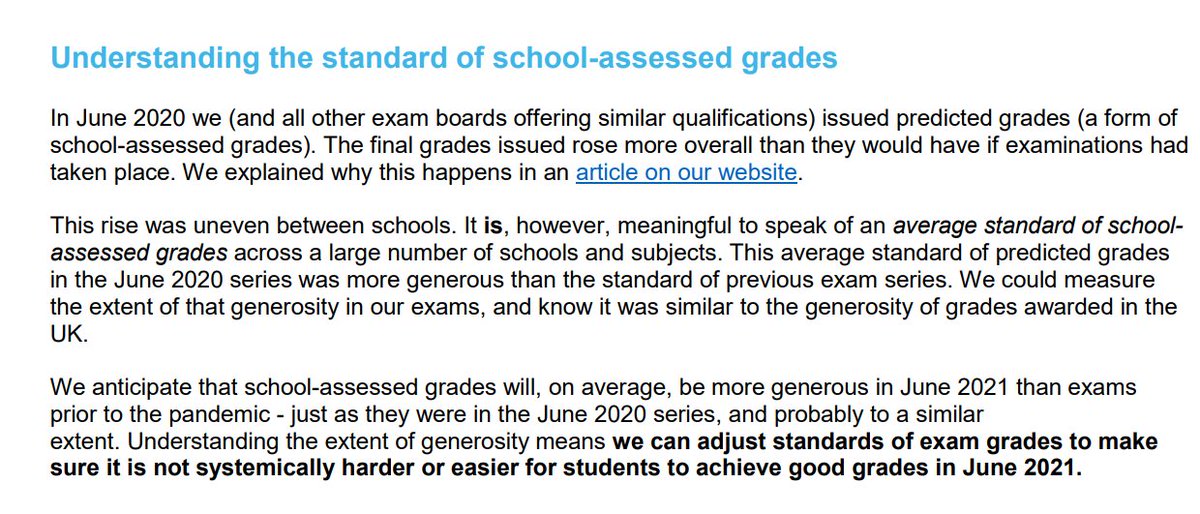Since students are now adamant on their demand of SAGs, I thought about looking at the Cambridge Guidelines on SAGs this year. I& #39;m not advocating for or against the demand, but I feel students should know what they& #39;re supporting. A thread (1)
Unlike the previous year Cambridge will not be giving out expected grades. It will instead want three separate piece of evidence from three separate parts of the course as evidence, along with a grading criteria from the school. Attaching evidence too (2)
Now what is Cambridge basically saying? To put it simply, if you are giving A levels physics and your course has a practical and theoretical component, your three pieces of evidence need to cover both of these. Not only that but your internal grading has to be standardized- (3)
- as well. In the case that one of your evidences is a collective examination for example a mock, then everyone should have been graded on the same basis, and even that rationale has to be explained within the "Rationale Document" that each school has to submit (4)
Now why is this a problem? Firstly the validity of an online exam is always brought into question whenever there is an online exam, which Cambridge obviously will, however, even bright students do not score very well throughout the year. (5)
This would mean that in a school of 150 students, they are going to have to collect evidence on an individual level for every single one, and provide exact details about which circumstances that student attempted the said evidence. (6)
Now you might be thinking that schools can automatically inflate grades, but Cambridge has made a policy on which they will curtail this practice this time around (will cover this at the very end) (7)
This effectively means that schools are just left with submitting the mocks, mids and internals that they collected over the course of the year, and this piece of evidence has to be standardized and it HAS to show demonstrated ability of a candidate for them to get a grade (8)
Now on to how schools will hand out these grades. Instead of outlining the steps myself I& #39;ll just attach the first two steps: internal standardization, marking, and internal moderation. Please note that not only is it extremely lenghty, but has multiple checks and balances(9)
Now let me turn your attention towards one particular part of internal moderation: the rank order (ring a bell?). Schools will once again be asked to produce a rank order, now this is very relevant and I& #39;ll elaborate how bear with me(10)
Once all of this is done the moderator/school has to decide a grade for each piece of evidence based on guidelines from Cambridge, and then submit a final grade to Cambridge. Now this is where Cambridge will standardize your grades based on their own criteria(11)
Now to actually allot you a grade, Cambridge will identify certain "Benchmark centers" where entries larger in number. Cambridge will compare the current result to that of June 2019.(12)
This is because they feel that these centers would show more or less the same trend in 2021 as they did in 2019 when physical papers actually took place. For example, if 50 students took As in 2019, they expect a similar figure this year too, HOWEVER: (13)
Cambridge understands that the standard for assessed will be slightly higher than that of physical exams. So they will use the schools rank order of grades, and their own prior information for external standardization. Ring a bell? This is exactly what happened the last time (14)
- they gave grades, when there was a huge discrepancy between what the students would have gotten and what they got. Attaching parts from the Cambridge doc for students to read (15)
But this also means another thing. The fact that Cambridge will be cross checking trends means that any school that tries to artificially inflate grades will be caught. Cambridge has also said that they will WITHHOLD the grades of these centers.(16)
Summarizing it all, schools need to provide detailed evidence, along with the circumstances that evidence was collected in to award a grade. This means that if a good student has done badly throughout the year, they can& #39;t just be awarded a good grade (17)
Furthermore in the case of mocks and mids, the criterion for fair grading has to be established, and sent to Cambridge, and knowing full well how mocks and mids took place here, we know how that evidence will turn out (18)
The schools then assign a rank order of grades, meaning that no, the school cannot give all of you As this time around, someone will get Cs Ds and Es if that is what they demonstrated in the evidence. Cambridge will cross check this with June 2019 and adjust the trend (19)
If your school to artificially inflate your grades, they will be caught by comparison with benchmark centers, meaning that if you did not show demonstrated ability during the year, do not expect an inflated grade this time (20)
And lastly, very respectfully, this thread is partly directed towards @MJibranNasir who taunted Mr. Shafqat on having not read Cambridge guidelines, I& #39;m afraid he has not read them himself, else he would have at least tried to educate the students on what they are demanding (21)

 Read on Twitter
Read on Twitter












